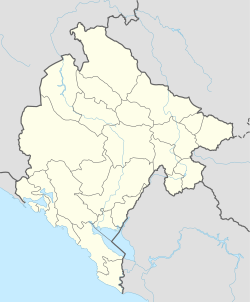Danilovgrad
Danilovgrad
Даниловград | |
|---|---|
Town and municipality | |
 World War II monument in Town main square | |
| Coordinates: 42°37′N 19°03′E / 42.61°N 19.05°E | |
| Country | |
| Municipality | |
| Settlements | 80 |
| Government | |
| • Mayor | Zorica Kovačević (DPS) |
| • Ruling party | DPS - SD |
| Area | |
| • Town and municipality | 501 km2 (193 sq mi) |
| Population (2011 census) | |
| • Density | 33/km2 (90/sq mi) |
| • Urban | 5,156 |
| • Rural | 11,620 |
| • Municipality | 18,472 |
| Time zone | UTC+1 (CET) |
| • Summer (DST) | UTC+2 (CEST) |
| Postal code | 81410 |
| Area code | +382 20 |
| ISO 3166-2 code | ME-07 |
| Car plates | DG |
| Climate | Cfa |
| Website | http://danilovgrad.me/ |
Danilovgrad (Template:Lang-cnr) is a town in central Montenegro. It has a population of 6,852 (2011 census). It is situated in the Danilovgrad Municipality which lies along the main route between Montenegro's two largest cities, Podgorica and Nikšić. Via villages, Danilovgrad forms part of a conurbation with Podgorica.
The town of Danilovgrad is located in the fertile valley of the Zeta River, sometimes called also the Bjelopavlići plain, after the name of the local clan. It is the centre of the Danilovgrad municipality, which has a population of 18,472.
History
In the surroundings of Danilovgrad, there are remains of Gradina (Martinići), dating back to the time of the Serbian ruler Petar Gojniković, from the Vlastimirović dynasty. The court was built by another member of the dynasty, prince Mutimir, who was also once buried in there. Gradina is also a prominent seat from the Nemanjić period, believed to be the birthplace of Rastko Nemanjić, also known as Saint Sava, the founder of the Serbian Orthodox Church.
Danilovgrad was founded with the purpose of being the capital of Montenegro. Foundations for this planned city were first laid by King Nikola I in 1870. However, after the cities of Nikšić and Podgorica were liberated from Ottoman hands, during the Congress of Berlin its significance diminished. It got its name after Nicholas' predecessor Prince Danilo.
World War II
On May 31, 1944, a USAF Consolidated B-24 Liberator crashed in Danilovgrad.[1] Although its entire crew of 10 ejected and survived, they were later caught and became prisoners of war.[1] On July 23, 1944, at least 48 members of the League of Communist Youth of Yugoslavia were killed in a mass execution by Chetniks in the village of Lazine.[2][3]
During the Yugoslav Wars
On April 14–15, 1995, a pogrom drove out the Romani population in one of Danilovgrad's neighborhoods, Božova Glavica.[4]
On March 24, 1999, the Milovan Šaranović barracks in Danilovgrad were bombed by NATO aircraft, killing a soldier named Saša Stojić.[5] He was the first victim of the NATO bombing of Yugoslavia.[5]
Climate
Like many parts of Montenegro, Danilovgrad has a humid subtropical climate (Cfa according to the Köppen climate classification) with cool winters and hot, drier summers. On 8 August 2012, Danilovgrad recorded a temperature of 44.8 °C (112.6 °F), which is the highest temperature to have ever been recorded in Montenegro.[6]
Demographics
According to the 2011 census, the population of the town was 5,156.[7]
| Ethnicity | Number | Percentage |
|---|---|---|
| Montenegrins | 3,637 | 70.5% |
| Serbs | 1,118 | 21.7% |
| Albanians | 20 | 0.4% |
| Russians | 14 | 0.3% |
| Croats | 8 | 0.2% |
| Roma | 7 | 0.1% |
| other/undeclared | 352 | 6.8% |
| Total | 5,156 | 100% |
Sports
The local football team is FK Iskra, who have been playing in the country's top tier since 2015. They host their games at the Braća Velašević Stadium. The town's basketball team is KK Danilovgrad and RK Danilovgrad is the handball club.
Transport
Danilovgrad is situated approximately halfway between two largest Montenegrin cities, Podgorica and Nikšić, on the main road that connects these two. It is also served by the Nikšić–Podgorica railway.
Podgorica Airport is 30 km (19 mi) away, and has regular flights to Belgrade, Budapest, Bari, Zagreb, Skopje, Zürich, Frankfurt, Ljubljana, Paris, Rome and Vienna.
International relations
Twin towns – sister cities
Danilovgrad is twinned with:[8]
 Crvenka (Kula), Serbia
Crvenka (Kula), Serbia Donetsk, Ukraine
Donetsk, Ukraine Grodzisk Mazowiecki, Poland[9]
Grodzisk Mazowiecki, Poland[9] Roosendaal, Netherlands
Roosendaal, Netherlands Serpukhov, Russia
Serpukhov, Russia
References
- ^ a b Joe Baugher. "1942 USAAF Serial Numbers (42-50027 to 42-57212)".
- ^ "POLOŽEN VIJENAC NA LAZINAMA" (PDF). Archived from the original (PDF) on 30 December 2018. Retrieved 14 October 2022.
- ^ "Na Lazinama (kod Danilovgrada) četnici streljali 48 članova SKOJ-a". Archived from the original on 21 January 2021. Retrieved 14 October 2022.
- ^ "Slučaj Danilovgrad" (PDF). Swedish Helsinki Committee for Human Rights. 2004.
- ^ a b Jelena Kulidžan (March 25, 2014). "Od bombardovanja do članstva u NATO". Deutsche Welle (in Serbian). Retrieved December 28, 2018.
- ^ Masters, Jeff. "2012: Earth's 10th warmest year on record, and warmest with a La Niña". Weather Underground. Archived from the original on 17 January 2013. Retrieved 17 January 2013.
- ^ "Tabela N1. Stanovništvo prema nacinalnoj odnosno etničkoj pripadnosti po naseljima, Popis stanovništva, domaćinstava i stanova u Crnoj Gori 2011. godine" (in Montenegrin). Statistical Office of Montenegro. Retrieved January 27, 2012.
- ^ "Bratimljenje" (PDF). database.uom.me (in Montenegrin). Zajednica opština Crne Gore. January 2013. p. 29. Retrieved 2019-12-29.
- ^ "Gminy partnerskie". grodzisk.pl (in Polish). Gmina Grodzisk Mazowiecki. Retrieved 2019-12-29.
External links
- Official site
- Visit-Montenegro.com Archived 2007-02-12 at the Wayback Machine


